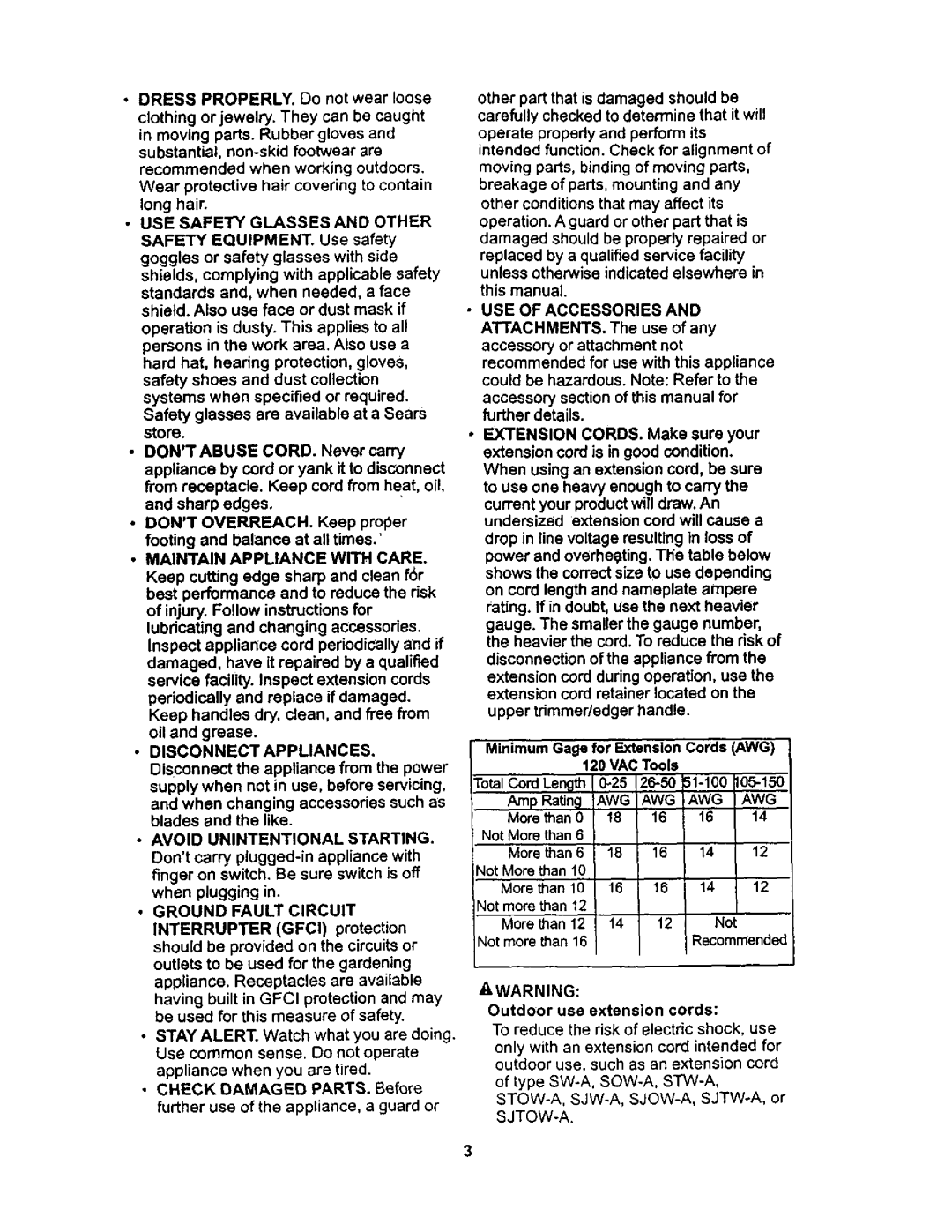
•DRESS PROPERLY. Do not wear loose clothing or jewelry. They can be caught in moving parts. Rubber gloves and substantial,
•USE SAFETY GLASSES AND OTHER SAFETY EQUIPMENT. Use safety
goggles or safety glasses with side shields, complying with applicable safety standards and, when needed, a face shield. Also use face or dust mask if
operation is dusty. This applies to all persons in the work area. Also use a hard hat, hearing protection, gloves, safety shoes and dust collection systems when specified or required. Safety glasses are available at a Sears store.
•DON'TABUSE CORD. Never carry
appliance by cord or yank it to disconnect from receptacle. Keep cord from heat, oil, and sharp edges.
•DON'T OVERREACH. Keep proper footing and balance at all times.'
•MAINTAIN APPLIANCE WITH CARE. Keep cutting edge sharp and clean f6r best performance and to reduce the risk of injury. Follow instructions for lubricating and changing accessories. Inspect appliance cord periodically and if damaged, have it repaired by a qualified service facility. Inspect extension cords periodically and replace if damaged.
Keep handles dry, clean, and free from oil and grease.
•DISCONNECT APPLIANCES.
Disconnect the appliance from the power supply when not in use, before servicing,
and when changing accessories such as blades and the like.
•AVOID UNINTENTIONAL STARTING. Don'tcarry
•GROUND FAULT CIRCUIT
INTERRUPTER (GFCI) protection should be provided on the circuits or outlets to be used for the gardening appliance. Receptacles are available having built in GFCI protection and may be used for this measure of safety.
•STAY ALERT. Watch what you are doing. Use common sense, Do not operate appliance when you are tired.
•CHECK DAMAGED PARTS. Before further use of the appliance, a guard or
other part that is damaged should be carefully checked to determine that it will operate properly and perform its intended function. Check for alignment of moving parts, binding of moving parts, breakage of parts, mounting and any other conditions that may affect its operation. A guard or other part that is damaged should be properly repaired or replaced by a qualified service facility unless otherwise indicated elsewhere in this manual.
•USE OFACCESSORIESAND
ATrACHMENTS. The use of any accessory or attachment not recommended for use with this appliance could be hazardous. Note: Refer to the
accessory section of this manual for further details.
•EXTENSION CORDS. Make sure your extension cord is in good condition. When using an extension cord, be sure to use one heavy enough to carry the current your product will draw. An undersized extension cord will cause a
drop in line voltage resulting in loss of power and overheating. The table below shows the correct size to use depending on cord length and nameplate ampere rating. If in doubt, use the next heavier
gauge. The smaller the gauge number, the heavier the cord. To reduce the risk of
disconnection of the appliance from the extension cord during operation, use the extension cord retainer located on the upper trimmer/edger handle.
Minimum Gage for Extension Cords (AWG)
120 VAC Tools
TotalCord Length | ||||
Amp Rating AWG AWG AWG AWG | ||||
More than 0 | 18 | 16 | 16 | 14 |
Not More than 6 |
|
|
|
|
More than 6 | 18 | 16 | 14 | 12 |
Not More than 10 |
|
|
|
|
More than 10 | 16 | 16 | 14 | 12 |
Not more than 12 |
|
|
|
|
Morethan 12 I | t4 | 12 |
| Not |
Not more than 16 I |
|
| Recommended | |
_,WARNING:
Outdoor use extension cords:
To reduce the risk of electric shock, use
only with an extension cord intended for outdoor use, such as an extension cord of type
3
